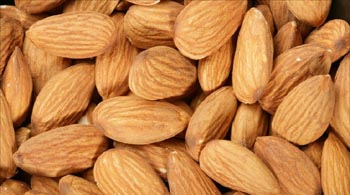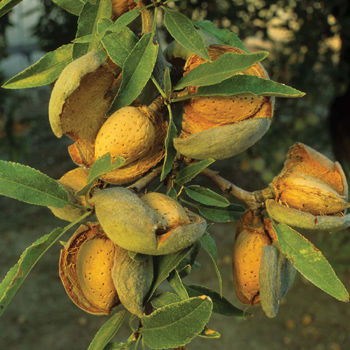 |
|
 |
|
Almonds nutrition facts Wonderfully delicious, almonds have long been revered as the epitome of wellness and health. The nuts are among the richest sources of health-benefiting nutrients essential for optimum health. Its plant is a small deciduous tree, native to mineral-rich West-Asian mountain ranges that provide fertile conditions favorable for their growth. In recent years, it is being cultivated in many regions of the world as an important commercial crop.
 Botanically, they are the fruits from species of tree belonging to the family of Rosaceae, of Genus: Prunus. Scientific name: Prunus dulcis.
During spring season, the tree bears whitish-pink flowers that ultimately become fruits by autumn. In structure, the fruit is a drupe. A single edible seed (kernel), known as ‘almond nut’, is actually enclosed inside the stony hard shell. Almond kernel features oval to conical in shape, brown in color, measuring about 2 cms in length and 1 cm in breadth and weigh about 1 to 1.5 g.
Health benefits of Almonds
Almond nuts are rich in dietary fiber, vitamins, and minerals and packed with numerous health promoting phyto-chemicals; the kind of well-balanced food ensuring protection against diseases and cancers.
These nuts are the complete source of energy as well as nutrients. They are especially, rich in mono-unsaturated fatty acids like oleic and palmitoleic acids that help to lower LDL or "bad cholesterol" and increase HDL or "good cholesterol." Research studies suggest that Mediterranean diet, which is excellent in monounsaturated fatty acids help to prevent coronary artery disease and strokes by favoring healthy blood lipid profile.
The nuts are an excellent source of vitamin E; contain about 25 g per100 g (about 170% of RDA). Vitamin E is a powerful lipid soluble antioxidant, required for maintaining cell membrane integrity of mucus membranes and skin by protecting from harmful oxygen-free radicals.
 Almonds are free in gluten and therefore, are one of the popular ingredients in the preparation of gluten-free food formulas. Such formula preparations are, in fact, healthy alternatives in people with wheat food allergy and celiac disease.
These nuts are packed with many important B-complex groups of vitamins such as riboflavin, niacin, thiamin, pantothenic acid, vitamin B-6, and folates. Together, these vitamins work as co-factors for enzymes during cellular substrate metabolism.
Further, they are also an incredible source of minerals such as manganese, potassium, calcium, iron, magnesium, zinc, and selenium.
Almond oil is extracted from the nuts used as an emollient. Applied regularly, it helps keep skin well protected from dryness. Additionally, the oil is used in cooking in Iran, and Turkey. It is also used as “carrier or base oil” in traditional medicines in aromatherapy, in pharmaceutical, and cosmetic industries.
Hand full of almonds a day provides much of recommended levels of minerals, vitamins, and protein. Besides, almond oil extracted from the nuts has been used in cooking, and in medicine.
Selection and storage
Almonds are available in the markets' year around. In the stores, however, different forms of nuts are sold such as shelled, un-shelled (without outer shell), salted, sweetened, or powdered, etc. Try to buy completely shelled or unshelled raw nuts instead of processed ones.
While buying, look for the nuts that feature bright brown color; compact and uniform in size, and feel heavy in hand. They should be free from cracks/cuts, mold, and spots and rancid smell.
Shelled almonds can be placed in cool dry place for years. Store un-shelled nuts inside airtight container and place in the refrigerator to avoid them turn rancid.
See Also Health Benefits of Watermelon Seeds, 8 ways to a healthy blood pressure, ways to control high blood pressure without medication, ARJUNA A HEART SAVING TREE, Flax seed nutrition facts, Cashew nut nutrition facts, Health Benefits of Brown Rice, Aloe Vera Juice The New Miracle Drink, Super Health Benefits of Sesame Seeds, Home Remedies for High Blood Pressure, 10 ways to control high blood pressure without medication, Almonds nutrition facts, Health benefits of Walnuts, Health benefits of black pepper, Surprising Health Benefits of Cinnamon, Explore the health benefits of garlic, Health Benefits of Drinking Green Tea, Amazing Health Benefits of ginger, Health Benefits of Turmeric, Best Fruits for Losing Weight, Eating Regularly To Lose Weight, Benefits of Clove in our day to day life, Health Benefits of Neem, Benefits of the Holy Basil (Tulsi), Health Benefit of red Chillies, Healthy Diet Habits, The healthiest way to lose weight , 10 Benefits to Drinking Warm Lemon Water Every Morning, Health Benefits of Apricot, Benefits of Honey in Weight Loss, Health Benefits of Indian Gooseberry or Amla, |
|
|
|
|
|
|
|
All Rights Reserved. Indyabiz.com







